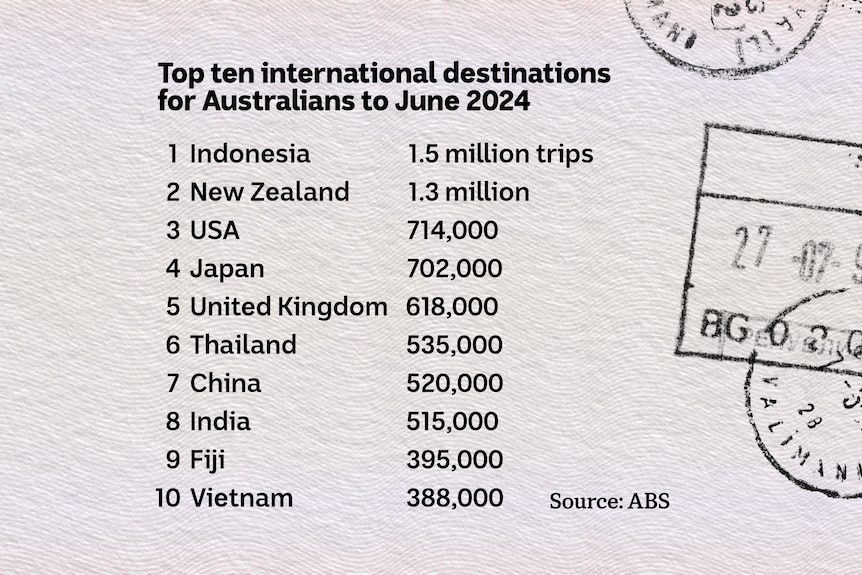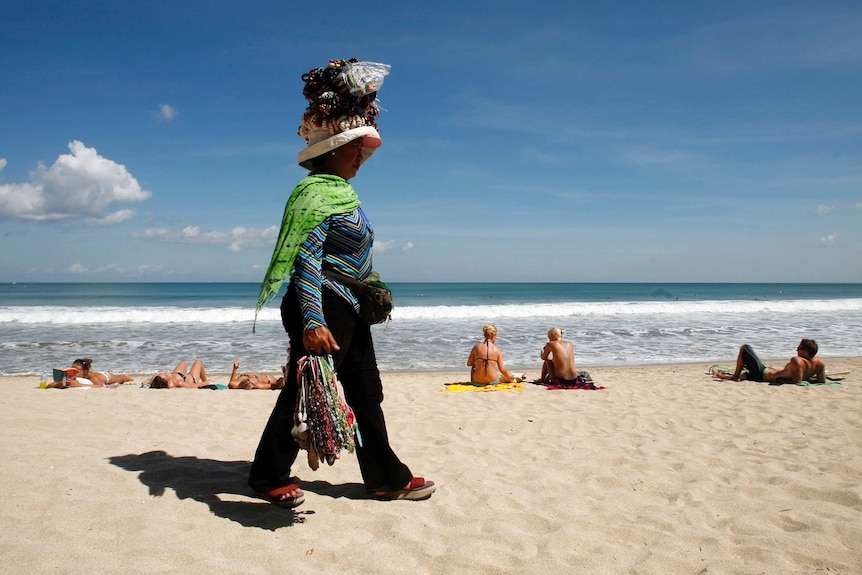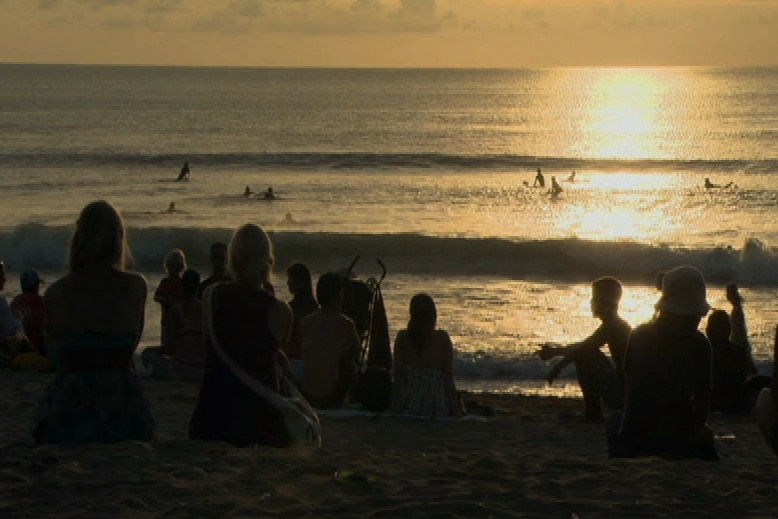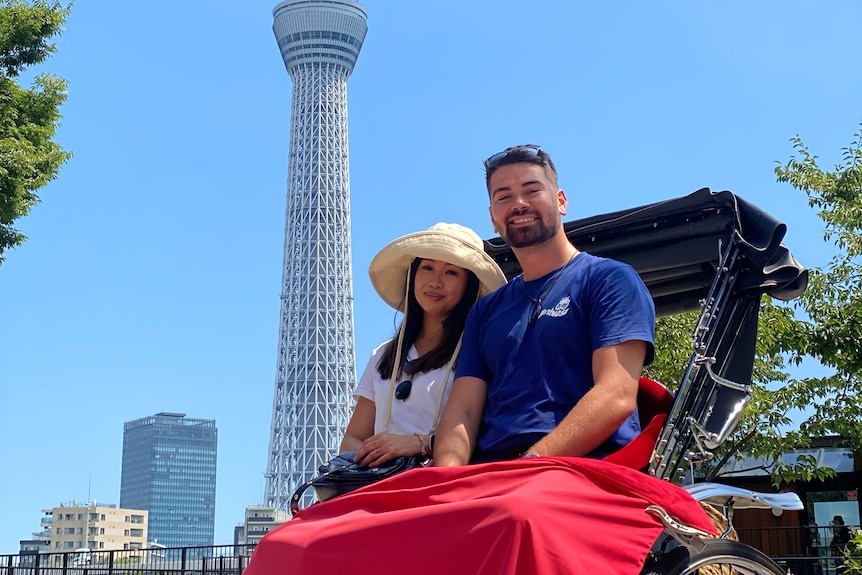Australians are travelling overseas in record numbers, fuelled by a phenomenon dubbed “revenge travel”, as they try to make up for lost time following COVID-19 border restrictions.
Despite the ongoing cost of living crisis, international travel has largely increased beyond pre-pandemic levels as Australians set out to reconnect with the world.
Recent data from the Australian Bureau of Statistics (ABS) showed that more than 11 million overseas trips were made in the year to June, an increase of 32 per cent on the previous year.
Dean Long is the CEO of the Australian Travel Industry, the peak body representing Australian travel agents and tour operators.
He said holidays accounted for the bulk of overseas travel, with destinations such as Bali and Japan booming, thanks to favourable exchange rates and affordable travel options.

ABS figures show Indonesia was the top tourist destination for Australians. (ABC News)
“Revenge travel was that outrageous surge we saw after borders reopened. We were all coming out of lockdown and ready to experience the world and reconnect with people,” Long said.
“It’s being strongly driven by those in the older demographic and also those in the younger demographic, who are looking to have shorter, one-hop vacations around the world.”
Despite the cost of living crisis, Mr Long said Australians still prioritised travel.
“It’s one of the absolutely fascinating parts of the Australian psyche and one that economists struggle to understand about our population,” Long said.
“Travel is an essential part of who we are and even in difficult times, we still maintain a very high percentage of spending on international and domestic travel.

Despite the cost of living crisis, Australians continue to prioritize travel. (Reuters: Murdani Usman )
“Travel is not a discretionary expense, it is essential for mental health and reconnecting with families and it is part of who we are.”
ABS figures show Indonesia was the top travel destination for Australians in the 12 months to June, with 1.5 million trips recorded, up almost 36 per cent on the previous year.
New Zealand was the second most visited destination with 1.3 million trips, the United States was the third most visited destination with 714,300 trips, Japan was fourth with a 126 per cent increase in visitors in the 12 months to June.
“Japan is doing incredibly well at the moment thanks to the currency change and we are also seeing the resurgence of Bali in Indonesia as a must-see holiday destination,” Long said.
“That comes at the expense of some of those higher-cost destinations, like Fiji, which were the first to reopen.”

ABS figures show Indonesia was the top tourist destination for Australians in the 12 months to June. (ABC News: Auskar Surbakti)
“I always have to have a vacation”
Laclan Pou and his partner Ebony Tayer recently returned from a 12-day trip to Japan, where they explored Osaka, Kyoto and Tokyo.
She said they managed their budget by setting aside a specific amount each week in a travel fund, separate from their savings, and were looking for cheap airfares.
In the end, they were able to book a round-trip flight from Cairns to Japan for $1,000.
“We are very smart with our money. We only buy what we have to buy and we save up to travel,” Pou said.

Laclan Pou and his partner created a travel fund to be able to travel abroad. (Supplied)
He said his goal is to take at least one international trip a year and his future travel plans include Thailand, the Philippines and New Zealand.
“I always have to have a holiday on the calendar. It gives you something to work towards,” he said.
“You have to work to live, not live to work.”
International visitors are left behind
While Australians are enthusiastically returning to travel, the inbound tourism market is still recovering.
Australian Tourism Export Council CEO Peter Shelley said international visits were about 80 per cent of pre-COVID levels.
“While record numbers of Australians are spending their money overseas, that spending is not offset by international tourist spending here,” Shelley said.
He stressed the need for Australia to step up its efforts to attract international visitors, citing global economic challenges and competition from other destinations.
“As a long-haul destination, we have always known that it takes more effort to convince visitors to commit to a holiday in Australia,” he said.

Laclan Pou and his partner Ebony Tayer recently returned from a 12-day trip to Japan. (Supplied)
“We hope that the upcoming peak season will allow us to recover more strongly.”
Tourism expert Professor Gui Lohmann, from RMIT University, said Italy and Greece were also popular destinations, particularly among older Australians.
“There is a significant proportion of society that has paid off their own homes, is less affected by interest rates and can afford to travel abroad,” said Professor Lohmann.
He said Australia was a nation of adventurers, eager to explore the world, and the country’s multicultural context and global family connections encouraged residents to travel.
“We Australians are comfortable with different cultures and tend to feel comfortable exploring other countries and cultures,” Professor Lohmann said.
“We are one of the most successful multicultural countries and that is reflected in the way we travel abroad.”
Charging…
#revenge #trips #data #shows #Australians #habit